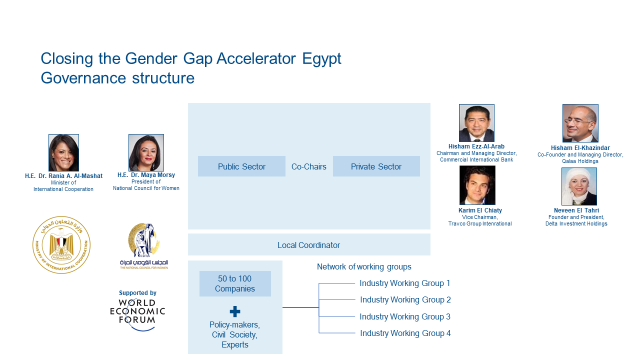
$50bn SDG-targeted investment proposals at SDG Investment Fair
Over 100 SDG-aligned projects with a total investment scope of $ 50 billion have been presented during the ...

Egypt is the first country in Africa and the Middle East region to launch “Closing the Gender Gap Accelerator,” which is a national public-private collaboration model enabling governments and businesses to take decisive action on closing economic gender gaps.
The gender accelerator model – launched by the Ministry of International Cooperation, the National Council for Women and the World Economic Forum – supports public and private leaders in shaping innovative pathways to promote gender equality, diversity, inclusion and economic mobility, which is central to Egypt’s reform agenda.
The accelerator focuses on four key objectives; preparing women for the post COVID-19 world of work, closing gender gaps in remuneration between and within sectors, enabling women’s participation in the labor force, and advancing more women into management and leadership roles.
Dr. Rania El Mashaat, Minister of International Cooperation, said, “The launch of Egypt’s Gender Gap accelerator highlights Egypt’s continuous commitment to apply required policies and structural reforms to push the gender agenda and empower Egyptian women, as women’s participation in the economy is macro-critical. The Gender Accelerator will bring together multi-stakeholder actors across the public and private sectors to generate local insight, develop local needs-based action plans and drive their execution”.
Mashaat added, “Leveraging on the World Economic Forum’s global platform, the accelerator will indeed help expedite the implementation of SDG 5 across sectors in Egypt and serve as a multi-stakeholder platform”.
“Closing the gender gap accelerator will be the hub for all the initiatives that fall under the Women’s Economic Empowerment Pillar of the Egyptian National Strategy for the Empowerment of Women 2030”, said Dr Maya Morsy, President of the National Council for Women, “It will also be the enabler for the economic opportunities for women to recover from the Covid19 pandemic. Adapting this tool to the Egyptian context is another guide that is used to enhance our own strategized & coordinated efforts for an effective and efficient outcome”.
This effort was crowned with the launch of the International Finance Corporation (IFC), a member of the World Bank Group, a new advisory program to improve women’s employment opportunities in Egypt, by highlighting how private sector companies can tap into the country’s large, underutilized female talent pool and spur economic growth.
This is a critical initiative. According to the National Council for Women, the COVID-19 pandemic poses a serious threat to women’s engagement in economic activities in Egypt.
The three-year program will help create family-friendly, flexible workplaces to make Egyptian businesses more resilient, agile and inclusive, especially in times of crisis.
Only 24 percent of working-age women participated in Egypt’s labor market in 2019, compared to 75 percent of men. Evening out those numbers is critical for economic growth, as the country’s GDP could rise by 34 percent if women and men participated equally.
“The participation of women is macro-critical, it is no longer lip service, all stakeholders from the public and private sector as well as IFIs are coming together to progress towards gender parity, as we see its quantifiable impact on GDP, productivity and as a catalyst to push the United Nations Sustainable Development Goals forward. We are proud that Egypt is the first country in the Middle East and Africa to launch the ‘Closing the Gender Gap Accelerator’, a private public platform for collaboration to reach gender parity, with the World Economic Forum,” said Minister Mashaat.
“Creating economic opportunities for women in Egypt is a strategic priority for IFC,” said Walid Labadi, IFC’s country manager for Egypt, Libya and Yemen. “Private sector companies are starting to realize the potential of the female workforce to overcome skill and talent shortages and spur economic growth. More flexible, remote and family-friendly working arrangements benefit companies and support both their female and male employees.”
To reach the widest group of firms, IFC will also partner with an Egyptian business association to create a peer-learning platform to raise awareness, share knowledge and improve women’s access to jobs. In partnership with the World Bank, IFC’s team will also work to help remove legal barriers to women’s employment by supporting economy-wide policy reform dialogue.
The program will be implemented in partnership with the government of the Netherlands, part of a broader effort aimed at private sector development in the Middle East and North Africa.
Over 100 SDG-aligned projects with a total investment scope of $ 50 billion have been presented during the ...
Global electric car sales are set to hit around 17 million by the end of ...
Ericsson Canada marked the Earth Day by joining the Environment and Climate Change Canada’s (ECCC) Net-Zero ...


اترك تعليقا